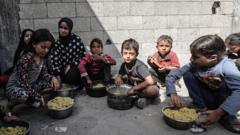Will the Gaza Health Crisis Impact Generations? Insights from WHO Chief

Published: 2025-10-22 06:00:14 | Category: world
The ongoing situation in Gaza has been described as a health "catastrophe" by Dr Tedros Adhanom Ghebreyesus, the director-general of the World Health Organization (WHO). He emphasised that the healthcare crisis will have long-lasting impacts, potentially lasting for generations. Despite some aid reaching the region following a ceasefire on 10 October, the levels remain insufficient to address the dire health needs of the population. Dr Tedros has called for an urgent increase in aid to rebuild Gaza's healthcare system and address the complex humanitarian challenges faced by its residents.
Last updated: 27 October 2023 (BST)
What’s happening now
Gaza is currently facing an unprecedented humanitarian crisis marked by severe health challenges. The WHO's Dr Tedros has articulated that the combination of famine, overwhelming injuries, and a collapsed healthcare system has created a situation that is both catastrophic and unprecedented. Following the ceasefire agreement, there has been a modest increase in aid, but it is still far below what is necessary to effectively address healthcare needs. The US is working to stabilise this ceasefire, aiming to facilitate the flow of aid without interference.
Key takeaways
- The WHO has warned of a long-term health catastrophe in Gaza.
- Current aid levels are significantly below what is needed for recovery.
- The ceasefire, while welcomed, has been fragile and subject to violations.
Timeline: how we got here
The crisis in Gaza has escalated dramatically since 7 October 2023, when a Hamas-led attack resulted in significant casualties and the capture of hostages. Following this, a military campaign was launched by Israel, leading to widespread destruction and loss of life. Key milestones include:
- 7 October 2023: Hamas attacks lead to approximately 1,200 Israeli deaths and capture of hostages.
- 10 October 2023: A ceasefire begins, allowing limited aid into Gaza.
- 27 October 2023: WHO reports ongoing health catastrophe and calls for increased aid.
What’s new vs what’s known
New today/this week
Dr Tedros has reiterated the urgent need for a substantial increase in aid to Gaza, highlighting that the current levels are inadequate to meet the health needs of the population. Aid deliveries have seen a temporary halt due to violence, underscoring the fragility of the ceasefire.
What was already established
The humanitarian crisis in Gaza has been escalating for years, with recent military actions exacerbating the situation. Previous reports from the UN indicated that famine conditions had been identified, while ongoing violence has prevented sustained aid efforts.
Impact for the UK
Consumers and households
The humanitarian crisis in Gaza is of concern to UK citizens, particularly those with family ties or humanitarian interests in the region. The potential for increased refugee flows could impact the UK, necessitating a response from both government and community organisations.
Businesses and jobs
Businesses in the UK involved in humanitarian aid or international development will be closely monitoring the situation, as changes in aid delivery may affect operations and opportunities for support in Gaza.
Policy and regulation
The UK government may face pressure to enhance its humanitarian support for Gaza, particularly in light of statements from the WHO and UN regarding the urgency of the situation. As the US plays a role in brokering peace, UK policymakers may need to align their strategies with international efforts.
Numbers that matter
- 68,229: Estimated deaths in Gaza since the beginning of the latest military campaign.
- 2,000: Tonnes of food aid needed daily, with current deliveries averaging 200-300 tonnes.
- 6,700: Tonnes of food that have entered Gaza since the ceasefire began on 10 October.
- $70 billion (£52 billion): Estimated cost to reconstruct Gaza, with 10% needed for the health system.
Definitions and jargon buster
- WHO: World Health Organization, a specialised agency of the United Nations responsible for international public health.
- Ceasefire: An agreement between conflicting parties to stop fighting for a specified time.
- Humanitarian aid: Assistance provided for humanitarian purposes, typically in response to crises.
How to think about the next steps
Near term (0–4 weeks)
In the immediate future, the focus will likely be on monitoring aid levels and the stability of the ceasefire. International pressure will be crucial in ensuring that aid flows increase adequately to meet the population’s needs.
Medium term (1–6 months)
As the situation develops, there will be a need for long-term planning for health system restoration and rehabilitation of the humanitarian infrastructure in Gaza. Engagement with international bodies and NGOs will be essential.
Signals to watch
- Monitoring of aid delivery statistics, particularly food and medical supplies.
- Updates on ceasefire violations and violence levels in the region.
- Statements from international organisations regarding the humanitarian situation.
Practical guidance
Do
- Stay informed through reliable news sources about the situation in Gaza.
- Support organisations providing humanitarian aid to Gaza.
- Advocate for government policies that prioritise humanitarian assistance.
Don’t
- Do not spread unverified information regarding the crisis.
- Avoid making assumptions about the situation without proper context.
- Do not overlook the complexity of the humanitarian needs in Gaza.
Checklist
- Check local and national organisations providing aid.
- Follow updates on humanitarian access and ceasefire status.
- Engage in community discussions about humanitarian support.
- Monitor government responses to the ongoing crisis.
Risks, caveats, and uncertainties
The situation in Gaza remains fluid, with ongoing violence and political complexities that could affect the delivery of aid. The information provided is subject to change as new developments occur. International responses may also vary, impacting the humanitarian landscape significantly.
Bottom line
The health crisis in Gaza is dire and requires urgent international attention and action. As the situation evolves, it is crucial for UK citizens and policymakers to remain engaged and responsive to the needs of the affected population.
FAQs
What is the current health situation in Gaza?
The health situation in Gaza is extremely critical, characterised by a collapsed healthcare system, widespread famine, and outbreaks of disease, as reported by the WHO.
How is the UK responding to the crisis in Gaza?
The UK government is under pressure to enhance humanitarian aid and support measures for the Gaza population, especially in light of recent reports from international organisations.
What are the long-term implications of the Gaza crisis?
Experts warn that the health crisis in Gaza will have lasting consequences, potentially affecting generations due to the current famine and mental health challenges.



